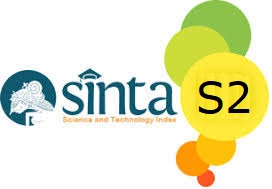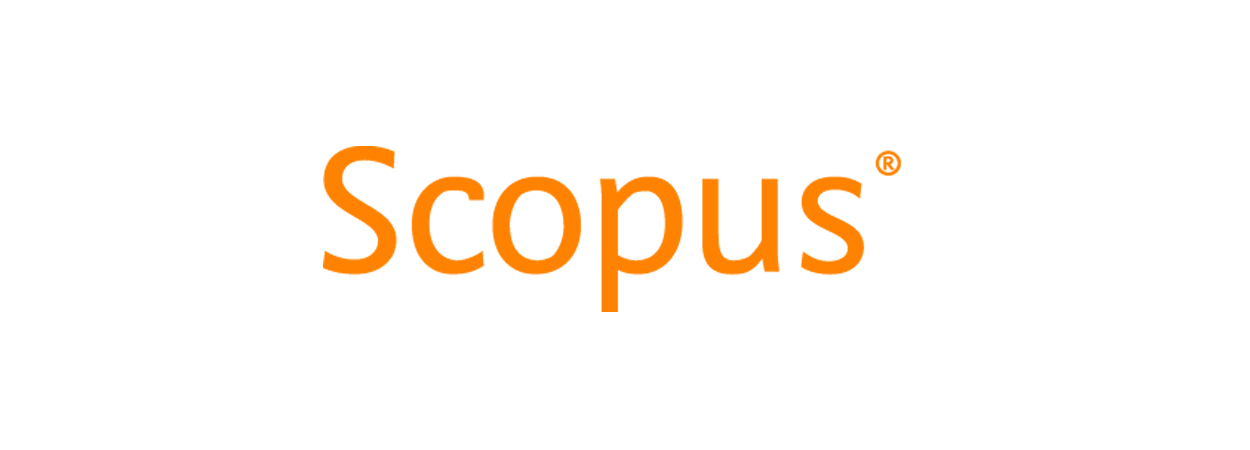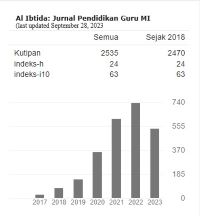The Effect of Edmodo-Based E-Learning toward Participation and Understanding of Elementary School Teacher Candidate
(1) Yogyakarta State University
(2) Yogyakarta State University
(3) University of PGRI Yogyakarta
(*) Corresponding Author
Abstract
Abstract
This study aims to determine the effect of Edmodo-based E-learning on the participation and understanding of elementary school teacher candidate in science 1 biology courses. This study used a quasi-experimental method using a non-equivalent control group design. The sample of this study was 49 elementary school teacher candidates in semester 2 of PGRI Yogyakarta University. The data collection technique used a participatory questionnaire instrument and a pretest-posttest comprehension test. The results of the Independent Sample t-Test show that the value of Sig. for the participation variable of 0.004 <0.05 and the Sig. for the understanding variable of 0.005 <0.05. While, the MANOVA test results show the value of Sig. for the participation variable of 0.004 <0.05 and the Sig. for the understanding variable of 0.005 <0.05. This means that there are differences in the increase in participation and understanding of elementary school teacher candidate after using Edmodo-based E-learning. In addition, the application of Edmodo-based E-learning also has a positive effect on the participation and understanding of elementary school teacher candidate on science topics. Edmodo-based e-learning makes elementary school teacher candidates more active in participating and easier in understanding science lecture material 1.
Keywords: edmodo-based e-learning, participation of elementary school teacher candidate, natural science understanding.Â
Â
Abstrak
Penelitian ini bertujuan untuk mengetahui pengaruh E-learning berbasis Edmodo terhadap partisipasi dan pemahaman calon guru Sekolah Dasar pada mata kuliah IPA 1 materi biologi. Penelitian ini menggunakan metode eksperimen semu dengan menggunakan desain penelitian non-equivalent control group design. Sampel penelitian ini adalah 49 calon guru Sekolah Dasar semester 2 Universitas PGRI Yogyakarta. Teknik pengumpulan data menggunakan instrumen angket partisipasi dan tes pemahaman melalui pretest-posttest. Hasil Uji Independent Sample t-Test menunjukkan nilai Sig. untuk variabel partisipasi sebesar 0.004 < 0.05 dan nilai Sig. untuk variabel pemahaman sebesar 0.005 < 0.05. Sedangkan hasil uji MANOVA menunjukkan nilai Sig. untuk variabel partisipasi sebesar 0.004 < 0.05 dan nilai Sig. untuk variabel pemahaman sebesar 0.005 < 0.05. Hal ini berarti bahwa terdapat perbedaan peningkatan partisipasi dan pemahaman calon guru Sekolah Dasar setelah menggunakan E-learning berbasis Edmodo. Selain itu, penerapan E-learning berbasis Edmodo juga berpengaruh positif terhadap partisipasi dan pemahaman calon guru Sekolah Dasar pada topik IPA. E-learning berbasis Edmodo menjadikan calon guru Sekolah Dasar lebih aktif dalam berpartisipasi dan lebih mudah dalam memahami materi perkuliahan IPA 1.
Kata kunci: e-learning berbasis edmodo, partisipasi calon guru SD, pemahaman IPA.
Full Text:
PDFReferences
Arifin, F. (2019). The Effectiveness of Google Classroom Media on the Students’ Learning Outcomes of Madrasah Ibtidaiyah Teacher Education Department. Al Ibtida: Jurnal Pendidikan Guru MI, 6(2), 271–285. https://doi.org/http://dx.doi.org/ 10.24235/al.ibtida.snj.v6i2.5149
Asmuni, & Hidayati, S. W. (2015). Summary for Policymakers. In Intergovernmental Panel on Climate Change (Ed.), Rekonstruksi Kurikulum dan Pembelajaran di Indonesia (Vol. 1, pp. 1–30). Retrieved from https://www.cambridge.org/core/product/identifier/CBO9781107415324A009/type/book_part
Balasubramanian, K., Jaykumar, V., & Fukey, L. N. (2014). A Study on “Student Preference Towards The Use of Edmodo as a Learning Platform to Create Responsible Learning Environment.†Social and Behavioral Sciences, 144, 416–422. https://doi.org/10.1016/j.sbspro.2014.07.311
Basori. (2013). Pemanfaatan Social Learning Network â€Edmodo†Dalam Membantu Perkuliahan Teori Bodi Otomotif Di Prodi PTM JPTK FKIP UNS. Jurnal Ilmiah Pendidikan Teknik Dan Kejuruan, 6(2), 99–105. https://doi.org/10.20961/jiptek.v6i2.12562
Chang, H. H., Fu, C. S., & Huang, C. Y. (2017). Willingness to Adopt or Reuse an E-Learning System: The Perspectives of Self-Determination and Perceived Characteristics of Innovation. Innovations in Education and Teaching International, 54(5), 511–520. https://doi.org/10.1080/14703297.2016.1194768
Contant, T., Bass, J., Tweed, A., & Carin, A. (2010). Teaching Science Through Inquiry- Based Instruction (K. Davis, ed.). United States of America: Pearson Education.
Creswell, J. (2009). Research Desain Qualitative, Quantitative, and Mixed Methods Approaches. In Sage (Third Edit, Vol. 8). https://doi.org/10.2307/1523157
Ginanjar, E., Darmawan, B., & Sriyono. (2019). Faktor-Faktor yang Mempengaruhi Rendahnya Partisipasi Belajar Peserta Didik SMK. Journal of Mechanical Engineering Education, 6(2), 206–219. https://doi.org/10.17509/jmee.v6i2.21797
Govindasamy, T. (2002). Successful Implementation of E-Learning Pedagogical Considerations. Internet and Higher Education, 4(3–4), 287–299. https://doi.org/10.1016/S1096-7516(01)00071-9
Hair, J., Black, W., Babin, B., & Anderson, R. (2009). Multivariate Data Analysis. Seventh Edition (Seventh Ed, Vol. 232).
Harcourt, D., & Gray, C. (2013). Action in children’s participatory research. International Journal of Early Years Education, 21(4), 265–267. https://doi.org/10.1080/09669760.2013.868239
Holme, T. A., Luxford, C. J., & Brandriet, A. (2015). Defining Conceptual Understanding in General Chemistry. Journal of Chemical Education, 92, 1477–1483. https://doi.org/10.1021/acs.jchemed.5b00218
Iskandar. (2017). Peningkatan Partisipasi Aktif Dan Hasil Belajar Siswa Kelas VII.E Dalam Pembelajaran Pendidikan Kewarganegaraan Melalui Penerapan Metode Pembelajaran Kooperatif Tipe STAD Di SMP Negeri 7 Pujut Lombok Tengah Tahun Pelajaran 2015/2016. Jurnal Pendidikan Mandala, 2(2), 46–64.
Lee, Y.-H., Hsieh, Y.-C., & Chen, Y.-H. (2013). An Investigation of Employees’ Use of E-Learning Systems: Applying The Technology Acceptance Model. Behaviour and Information Technology, 32(2), 173–189. https://doi.org/10.1080/0144929X.2011.577190
Mafulah, S., & Wilujeng, T. T. R. (2018). Pelatihan Pengenalan Aplikasi Pembelajaran Edmodo bagi Mahasiswa Universitas Kanjuruhan Malang. Jurnal Pemberdayaan Masyarakat, 3(1), 228–238. https://doi.org/10.21067/jpm.v3i1.2663
Mager, U., & Nowak, P. (2012). Effects of student participation in decision making at school. A systematic review and synthesis of empirical research. Educational Research Review, 7(1), 38–61. https://doi.org/10.1016/j.edurev.2011.11.001
Margunayasa, I. G., & Riastini, P. N. (2014). Pengaruh Petunjuk Praktikum Ipa Bermuatan Perubahan Konseptual Terhadap Peningkatan Pemahaman Konsep IPA Pada Mahasiswa Pgsd. JPI (Jurnal Pendidikan Indonesia), 3(1), 348–358. https://doi.org/10.23887/jpi-undiksha.v3i1.2917
Muhajir, Musfikar, R., & Hazrullah. (2019). Efektivitas Penggunaan E-Learning Berbasis Edmodo Terhadap Minat Dan Hasil Belajar (Studi Kasus Di Smk Negeri Al Mubarkeya). Cyberspace: Jurnal Pendidikan Teknologi Informasi, 3(1), 50. https://doi.org/10.22373/cj.v3i1.4725
Mukhlishoh, & Khisbiyah, I. (2015). Pengaruh Media Film Animasi Terhadap Motivasi Belajar Siswa Mata Pelajaran IPA(Studi Penelitian di MI AN-NUR Kota Cirebon). Al Ibtida: Jurnal Pendidikan Guru MI, 2(2), 1–15. https://doi.org/10.1016/b978-0-08-092526-4.50018-3
Nurjaya, G. (2015). Pengembangan Bahan Ajar Metode Pembelajaran Bahasa Dan Sastra Indonesia Berbasis Pembelajaran Kooperatif Jigsaw Untuk Meningkatkan Pemahaman Dan Kemampuan Aplikatif Mahasiswa. Jurnal Pendidikan Indonesia, 1(2), 102–111. https://doi.org/10.23887/jpi-undiksha.v1i2.4490
Okumura, S. (2020). Design and implementation of a telecollaboration project for primary school students to trigger intercultural understanding. Intercultural Education, 1–13. https://doi.org/10.1080/14675986.2020.1752546
Pratama, F. D., & Rahmawati, E. (2017). Karakteristik sensor kumparan dengan metode induksi untuk pengukuran fluks magnet. Menghilirkan Penelitian-Penelitian Fisika Dan Pembelajarannya, (November), 180–186.
Pratama, R. A., & Ismiyati, N. (2019). Pembelajaran Matematika Berbasis Edmodo Pada Mata Kuliah Teori Bilangan. Aksioma: Jurnal Program Studi Pendidikan Matematika, 8(2), 298–309. https://doi.org/https://doi.org/10.24127/ajpm.v8i2.2125
Pratiwi, E. R., Wonorahardjo, S., & Arief, M. (2016). Partisipasi Online dalam Pembelajaran Community of Inquiry (COI) Pada Materi Distilasi. Jurnal Pendidikan, 1(7), 1410–1416.
Precourt, E., & Gainor, M. (2018). Factors Affecting Classroom Participation and How Participation Leads to A Better Learning. Accounting Education, 1–19. https://doi.org/10.1080/09639284.2018.1505530
Purnawarman, P., Susilawati, & Sundayana, W. (2016). The Use of Edmodo in Teaching Writing in A Blended Learning Setting. Indonesian Journal of Applied Linguistics, 5(2), 242–252.
Purwaningtyas, Dwiyogo, W. D., & Hariyadi, I. (2017). Pengembangan Modul Elektronik Berbasis Online Dengan Program Edmodo. Jurnal Pendidikan, 2(1), 123, 121–129. https://doi.org/http://dx.doi.org/10.17977/jp.v2i1.8471
Qomariyah, S., Gunarhadi, & Rejekiningsih, T. (2019). Edmodo in Blended Learning to Increase Language Learners’ Understanding in Learning Grammar for Toefl. International Journal of Educational Research Review Need, 82–87. https://doi.org/https://doi.org/10.24331/ijere.486653
Rahardiansah, P. (2013). Transformasi Nilai Kearifan Lokal dalam Pendidikan Bangsa: Dialektika Pentingnya Pendidikan Berbasis Local Genius. Jakarta: Penerbit Universitas Trisakti.
Raharja, S., Wibhawa, M. R., & Lukas, S. (2018). Mengukur Rasa Ingin Tahu Siswa [Measuring Students’ Curiosity]. A Journal of Language, Literature, Culture, and Education, 14(2), 151–164. https://doi.org/10.19166/pji.v14i2.832
Reinfried, S., Aeschbacher, U., & Rottermann, B. (2012). Improving Students Conceptual Understanding of The Greenhouse Effect Using Theory-based Learning Materials That Promote Deep Learning. International Research in Geographical and Environmental Education, 21(2), 155–178. https://doi.org/10.1080/10382046.2012.672685
Safrida, L. N., Ambarwati, R., & Albirri, E. R. (2017). Partisipasi Mahasiswa dalam Pembelajaran Kooperatif Berbasis Lesson Study (Undergraduate Students Participation in Cooperative Learning Based on Lesson Study). Jurnal Edukasi, IV(3), 54–58.
Şenel, M. (2016). Virtual Learning Environments (VLE) and Virtual Classrooms: Edmodo. Participatory Educational Research, (Special Issue 2016-IV), 49–57.
Smit, B. H. J. (2013). Young People as Co-researchers: Enabling Student Participation in Educational Practice. Professional Development in Education, 39(4), 550–573. https://doi.org/10.1080/19415257.2013.796297
Sugiyono. (2016). Metode Penelitian Pendidikan. Bandung: Alfabeta.
Suwarno, L. (2017). Penerapan Model Pembelajaran Berpikir Melalui Pertanyaan (PBMP) Dengan Media Online Edmodo Dapat Meningkatkan Penguasaan Konsep Siswa Dalam Pelajaran IPA Pada Pokok Bahasan Sistem Tata Surya Pada Siswa Kelas VIII Di SMP Negeri 2 Mataram. Jurnal Ilmiah Mandala Education, 3(2), 1689–1699.
Teo, P. (2019). Teaching For The 21st Century: A Case For Dialogic Pedagogy. Learning, Culture and Social Interaction, 21(March), 170–178. https://doi.org/10.1016/j.lcsi.2019.03.009
Trust, T. (2017). Motivation, Empowerment, and Innovation: Teachers’ Beliefs About How Participating in the Edmodo Math Subject Community Shapes Teaching and Learning. Journal of Research on Technology in Education, 49(1–2), 16–30. https://doi.org/10.1080/15391523.2017.1291317
Uzun, E. (2015). Students’ Attitude Towards Edmodo as a Supplementary Tool for Higher Education. Participatory Educational Research, 78–83. https://doi.org/https://doi.org/10.17275/per.15.spi.2.10
Wadman, B. (2013). Edmodo versus Moodle - The Future of Virtual Learning Environments in Thailandmore. 1–8. Retrieved from academia.edu
Weiser, O., Blau, I., & Eshet-Alkalai, Y. (2018). How Do Medium Naturalness, Teaching-learning Interactions and Students’ Personality Traits Affect Participation in Synchronous E-learning? In Internet and Higher Education (Vol. 37). https://doi.org/10.1016/j.iheduc.2018.01.001
Wicaksono, A. (2017). Pengalaman E-Learning Secara Penuh: Penggunaan Edmodo dalam Kelas Virtual. Jurnal Dokumentasi Dan Informasi, 38(1), 63–79.
Zunaidah, F. N., & Mukmin, B. A. (2017). Pembelajaran Menggunakan Mind Mapping Berbasis Lesson Study dalam Upaya Meningkatkan Pemahaman dan Hasil Belajar Konsep Dasar IPA 2. Al Ibtida: Jurnal Pendidikan Guru MI, 4(2), 227. https://doi.org/10.24235/al.ibtida.snj.v4i2.1725
DOI: 10.24235/al.ibtida.snj.v7i2.6725
Article Metrics
Abstract view : 81 timesPDF - 16 times
Refbacks
- There are currently no refbacks.
Copyright (c) 2022 Al Ibtida: Jurnal Pendidikan Guru MI

This work is licensed under a Creative Commons Attribution 4.0 International License.
Al Ibtida: Jurnal Pendidikan Guru MI Indexed by:
Editorial Office:
FITK Building, 5th Floor, Department of Madrasah Ibtidaiyah Teacher Education, Faculty of Tarbiyah and Teacher Training, UIN Siber Syekh Nurjati Cirebon. Perjuangan Street of Sunyaragi, Cirebon City, West Java, Indonesia 45132. Phone. 0231-481264, Fax. 0231-489926, Email: alibtida@syekhnurjati.ac.id
Al Ibtida: Jurnal Pendidikan Guru MI is licensed under a Creative Commons Attribution 4.0 International License.



















